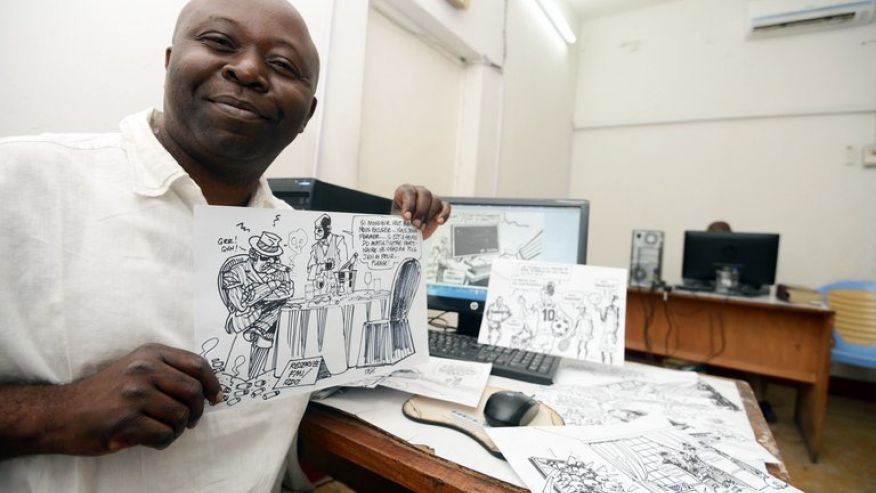
The headlines out of the Democratic Republic of Congo, which tend to evoke images of bloodshed, rape, ethnic hatred and government corruption, are usually no laughing matter.
But political cartoonist Kashoun Thembo is an expert at wringing humor out of his country’s tragedies, capturing the newsmakers and travails of life in DR Congo with a fierce pen that hits home and spares no one.
At the end of each afternoon, Kash — the pen name he took in 1992 to protect himself under the regime of late dictator Mobutu Sese Seko — joins the editorial team of Le Potentiel, the most widely read daily in the capital Kinshasa, to thrash out the day’s news.
The next morning the first thing many readers turn to is his work.
“I take the news and I reproduce it according to my rules, the journalists enrich it, we discuss it. I exaggerate but I keep the essence of the information,” Kash says.
“When people complain, my boss tells me I’ve hit the mark.”
There are plenty of targets here for a political cartoonist.
Wealthy in gold, diamonds and coltan, DR Congo nevertheless sits second from the bottom of the U.N.’s Human Development Index, a measure of development in countries around the globe.
Back-to-back wars that ravaged DR Congo from 1996 to 2003 have given way to a complex web of rebel groups still terrorizing the east.
And the world’s largest U.N. peacekeeping force has not managed to stop atrocities including killing of civilians, use of child soldiers and rape on a scale that has given the country the label of “rape capital of the world”.
Kash’s work regularly lampoons this sad reality.
In one of his cartoons, a U.N. peacekeeper leers at a young girl as she leaves school in the eastern province of North Kivu.
“What do you want to be when you grow up?” he asks her salaciously.
“Anything and everything… except a rape victim!” she answers, glaring at him.
Another depicts the tough job journalists have in the country, which watchdog Reporters Without Borders ranks 142nd in the world for press freedom.
A cigar-chomping strongman in a three-piece suit tells a young radio reporter, “You want information? You’ll have to go straight to the source” — and points her toward crocodile-infested waters.
Kash likes to quote Plantu, a veteran cartoonist for the French daily Le Monde, who asserts that to do the job well, you need “a good dose of bad faith”.
“A kind caricature doesn’t exist,” says the jovial Congolese cartoonist, 48, clad in a cap and with his work under his arm.
“You don’t do caricatures to please people…. It’s my way of taking part in the debate.”
— ‘Bad boy’ —
Born in Beni, in northeast DR Congo, Kash crossed the vast nation and took up classes at the school of fine arts in Kinshasa.
He says the event that launched his career was the death of Jamaican reggae legend Bob Marley.
“It was in ’81 and everybody wanted Bob Marley on his T-shirt. I never stopped drawing. When my father saw me with so much money on my hands he believed I had become a thief,” Kash says.
“I watched television with a pencil in my hand…. I learnt by experience,” he adds, recalling that his first caricature was of Ivory Coast’s late founding president, Felix Houphouet-Boigny.
His work was singled out by a fine arts professor who had worked in the Brussels studio of famous Belgian artist Herge, the creator of Tintin.
His first published cartoon targets included the United Nations, the great powers and neighbouring Rwanda — all of which says contribute to DR Congo’s misery.
“We Congolese are the first to blame, but they must stop looting us,” he says.
Kash, who is married with four children, puts his monthly income at $1,000 (750 euros) — a lot higher than the theoretical minimum wage of $90.
But life in Kinshasa is expensive. To top up his earnings from Le Potentiel, which has a daily print run of 3,000, he works for diplomatic missions that want to give parting staff a caricature to sum up their stay.
Asked whether his career is a sign of increasing freedom, Kash says he has never been threatened.
“When I am presented to dignitaries, those people are very kind,” he says.
“But once my back’s turned, they say ‘bad boy’.”












